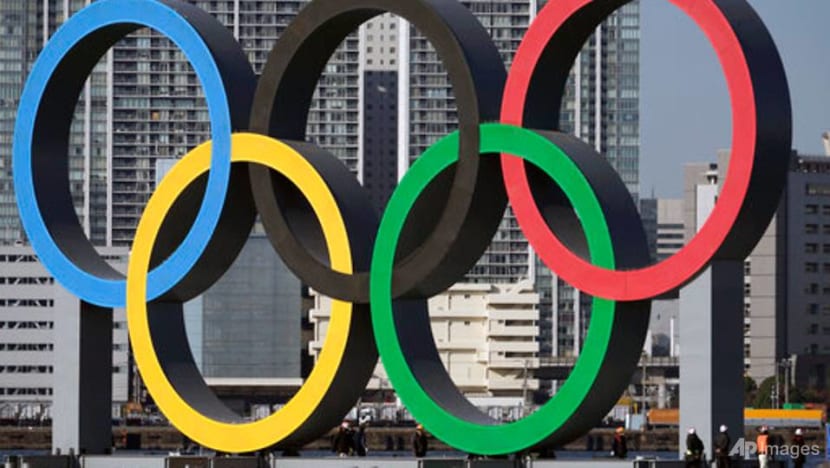How safe will the Tokyo Olympics be for Team SG?
Experts say the event's success will depend on overall compliance with measures designed to protect participants from COVID-19

The Olympic Symbol is reinstalled after it was taken down for maintenance ahead of the postponed Tokyo 2020 Olympics in the Odaiba section Tuesday, Dec. 1, 2020, in Tokyo. The five Olympic rings are back in Tokyo Bay. (AP Photo/Eugene Hoshiko)
SINGAPORE: COVID-19 countermeasures drawn up for the upcoming Olympic Games can help ensure the safety of contingents, including Team Singapore, but the key will be executing them and ensuring compliance, said medical experts.
With the Games slated to begin in about 50 days, momentum has begun to build as some countries vaccinate their contingents. Earlier this week, the Australian women's softball team became the first athletes to arrive in Japan, ahead of a pre-event training camp.
At least 15 of Singapore's athletes have already qualified for the Games, and it has continued to ramp up its preparations.
In response to queries from CNA, Sport Singapore (SportSG) said last week that the inoculation of athletes travelling to the Tokyo Olympics and the Paralympics is an "immediate priority".
READ: About 220 Team Singapore athletes, coaches and officials have completed COVID-19 vaccinations: SportSG
"Sport Singapore will ensure that the Team Singapore contingent are vaccinated before the upcoming major Games. Athletes with existing medical conditions will consult the Singapore Sport Institute Medical team on their suitability to receive the vaccine,” said head of the Singapore Sport Institute Toh Boon Yi.
Speaking to CNA, infectious disease expert Dr Ling Li Min said that it was possible for organisers to pull off a successful Games, but this would be dependent on a number of factors.
These include minimised interaction between those in the Olympic bubble and the general public as well as minimised interaction between representatives from each team.
“We are social creatures, we end up wanting to go and mix with each other, and talk to each other. So there needs to be a lot of people on site (and) on duty ensuring that (adherence) is happening,” said Dr Ling, who is an infectious disease specialist at Rophi Clinic.
“Not just having it (the rules) in the books, and telling them … this is what they need to do. But on the ground, you need to have chaperones, officials and these officers to ensure that it is adhered to.”
READ: IN FOCUS: Dedication amid the delay - Team SG prepares for an Olympics which remain in doubt
Dr Asok Kurup, an infectious diseases physician at Mount Elizabeth Hospital, described organising the Games as an "absolutely Herculean task".
“Theoretically, what is written on paper is one thing, but the logistics of moving it around and practicalising it is something completely different,” he said.
He noted that compliance would also not be guaranteed.
“When we are managing some of these people who are coming for sporting events, even in our local setting, they all come from different backgrounds, and some are very compliant and some are not compliant at all,” he explained.
Among the measures that have been unveiled by organisers so far include a daily testing regime for athletes, as well as the mandatory wearing of a face mask “at all times”, except when training, competing, eating, drinking, sleeping or during interviews.
Within the Olympic village, seating capacity at the main dining hall has also been limited to allow for social distancing, while congestion levels on each floor will be communicated regularly via a smartphone application.
While a decision has already been made to bar foreign spectators from the event, organisers have said that they will decide this month if local spectators will be allowed.
If the Games are played out in front of empty stands, this would help further reduce risks, said Dr Ling.
READ: Japan considers asking Olympic fans for negative COVID-19 tests, vaccinations: Report
“Wherever there are crowds, you know in the next two to three weeks that they are going to be hammered by big clusters. We’ve seen it in India, we’ve seen it in Korea, we’ve seen it in the UK. We don’t need a demonstration from Japan,” she added.
Having fewer spectators would also make contact tracing and medical care “easier” in the event that there are a significant number of unvaccinated individuals, said Dr Paul Tambyah, infectious diseases expert and president of the Asia Pacific Society of Clinical Microbiology and Infection.
“There is the possibility that if the general public are not fully vaccinated that clusters could emerge at social events or venues attended by incompletely vaccinated athletes as happened in Taiwan with the pilots and the adult venues,” he noted.
Following a fourth wave of COVID-19 cases, Japan is currently under its third state of emergency, which was declared in late April.
Among the slate of measures which are part of the move, the government has required restaurants, bars, and karaoke parlours serving alcohol to close, and big sporting events to be held without spectators,
The wave peaked in the middle of May as the country’s seven day average number of cases stood at almost 6500, a record high.
READ: COVID-19: Japan to declare 'short, powerful' emergency in Tokyo, elsewhere
But since then, numbers have begun to drop.
On a national basis, Japan has recorded a close to 20 per cent week-on-week decline for two consecutive weeks.
Tokyo is following on a similar trajectory. On Tuesday, the capital reported a total of 471 COVID-19 cases - a 35.66 per cent decline from two weeks before.
Late last month, the Japanese government also opted to extend its state of emergency in Tokyo, Osaka and seven other prefectures by three weeks to June 20.
The fourth wave coupled with the slow pace of vaccinations - Japan has fully vaccinated less than five per cent of its population despite a recent accelerated pace - mean that the current situation is “not quite ideal”, noted Dr Ling.
And while COVID-19 cases have dropped, she noted that it remains to be seen what numbers will be like later this month.
“It’s come down a bit, but we don’t know where things are going in June. There’s still a lot of things up in the air,” she explained. “Anything can happen in the next six weeks.”
In an interview with CNN last week, Singapore's Minister for Foreign Affairs Vivian Balakrishnan expressed "confidence" in the Japanese administration.
"I do have confidence in the Japanese administration, they know what they are doing. And I’m sure they will do their best to make sure that they proceed, that all our athletes will be safe," he said.
"So as of now, we are prepared and we’ll take all the necessary precautions. And obviously in the case of the Singapore delegation, you know that we will be vaccinated as well."
VACCINATIONS 'NOT FOOLPROOF'
Experts also noted that vaccinations would help ensure the safety of those attending the event, but cautioned that this would be one of the many measures required.
“It is one of the useful measures but it is not the only measure (needed to be in place),” said Dr Ling.
“Even with vaccinations, it is not foolproof. There is no vaccine that is 100 per cent efficacious for adults … If one takes (the) Pfizer (vaccine) for instance (which is) 95 per cent efficacious, that means 5 per cent of the people after vaccination will still have symptomatic infections (and) will still get infected.”
This would mean there remains a chance that a small percentage of those vaccinated who remain “at risk”, she added.
According to IOC President Thomas Bach, as many as 75 per cent of the residents of the Olympic Village are already vaccinated or have secured vaccination; and that there is “good reason” to believe that this figure will be well over 80 per cent at the time of the Games.
A number of countries including South Africa, the United Kingdom and Australia have already said that they will be vaccinating their contingents before the Games.
In addition, US drugs giant Pfizer and its German partner BioNTech also announced a deal with the International Olympics Committee (IOC) to provide vaccines to competitors and staff members at the event.
READ: Pfizer, BioNTech to supply COVID-19 vaccines for Olympic athletes
In a statement, the firms said they would coordinate with national sporting bodies to make sure that coronavirus vaccines are available to anyone who needs one before travelling to Japan.
According to the IOC, any additional doses delivered by Pfizer and BioNTech will not be taken out of existing programmes, but will be in addition to existing quotas and planned deliveries around the world.
However, there remains no mandatory requirement that athletes, coaches, officials attending the Games have to be vaccinated before they enter the country.
Dr Kurup noted should there be mass transmission of the virus within the bubble, this could potentially threaten the Games.
“It's transmitting within the bubble that's more worrisome. You may contain it, it doesn't spread into the community, but then then the whole Games will be affected,” he said.
“When you think about every sporting event (being held at the Games) and trying to allocate resources for everything in this current era - It is challenging, (I) wish them all the best."
Last Thursday, Prime Minister Lee Hsien Loong expressed his well wishes for the athletes travelling to Tokyo.
"Our sporting community is one of the groups hard hit by the pandemic," said Mr Lee in a Facebook post.
"Team Singapore launched a campaign to support our athletes as they prepare for the Olympics and Paralympics, which were postponed last year due to COVID-19. Despite the disruptions, they have been training hard and making sacrifices, including deferring their studies."
Replying to CNA's queries, the Singapore National Olympic Council (SNOC) said that the athletes and their performance teams were working hard in the final stages of their preparation ahead of the Tokyo Olympics.
“With the support from the Government, National Sports Associations and Singaporeans-at-large, Team Singapore has been able to continue training under the current safe management measures," said a SNOC spokesperson.
"We continue to work closely with the (International Olympic Committee), Tokyo Organising Committee and the respective agencies and authorities in Singapore to ensure the health, safety and welfare of the contingent as they fulfil their Olympic aspirations."












